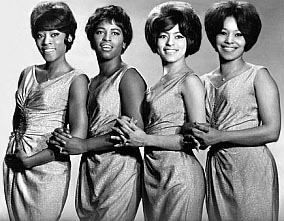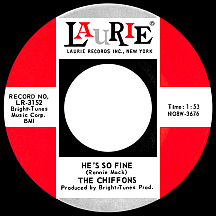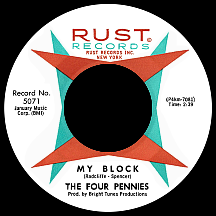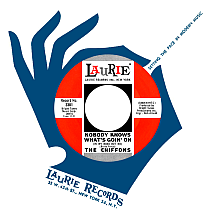THE CHIFFONS
Who are The Chiffons? Fabric, dresses or fluffy desserts notwithstanding (which would be singular "whats" anyway), the question has one easy answer and at least two others that are less obvious. Chronologically, the most obscure music act comes first: a Chiffons group, formed around 1960 in Los Angeles, struggled from the get-go. The general consensus is there were four members: Marie Robinson, Carlotta Robinson, Joyce Chase and Marie Gaddness, none of whom have had much to say about what must have been an exhilarating experience. Three records on as many labels appeared in consecutive years, the first, "Tonight's the Night," a cover of The Shirelles' autumn '60 hit (penned by Luther Dixon and Shirelles lead singer Shirley Owens) that uses a suspiciously similar backing track. It charted nationally and probably slowed the momentum of what could have been a top ten hit for the New York-based group. The L.A. Chiffons surfaced again in '61 with "Never, Never" on the Wildcat label and in '62 with "Doctor of Hearts" on the more prestigious Reprise arm of Warner Bros. Records. All six sides of these 45s are quite catchy and, for the most part, exhibit strong production values. But even on the actual labels information is sketchy and the full story of the group remains shrouded in mystery.
The second answer is the easy one: the widely-known, ever-popular Chiffons, those "He's So Fine" girls. Judy Craig, Patricia Bennett and Barbara Lee were students at James Monroe High in the Bronx, New York in 1962 when they crossed paths with Ronnie Mack, a former member of The Marquis, a male outfit (he was Ronald Mack then) with a female lead singer, June Bateman. In 1956, when he was 16, they recorded a doo wop single, "Bohemian Daddy," for the Onyx label. Convinced songwriting and managing might be a more compensable career path, he offered to manage the group and convinced them to bring on a fourth member, the slightly older and more experienced Sylvia Peterson, who had sung with Little Jimmy and the Tops, a group from Harlem that recorded Mack's "Puppy Love" for V-Tone Records in 1959.
Ronnie was a hard worker and his timing was spot-on. The Tokens (Hank Medress, Jay Siegel and brothers Phil Margo and Mitch Margo), who'd reached number one with "The Lion Sleeps Tonight" in late '61, were not content to rest on the laurel and invested the windfall from that major hit into a company they called Bright-Tunes Productions. Mack approached them with a cute ditty he'd written, "He's So Fine," and talked up this great new girl group he'd found. The Chiffons (the name was more or less chosen out of thin air), clueless about Ronnie's efforts on their behalf, suddenly found themselves in a studio singing 'Doo-lang, doo-lang, doo-lang'...and a classic was born. After considerable effort (and rejection), Laurie Records of N.Y. took a chance and released the record (lead vocal by Judy) at the end of 1962; within three months it was number one. But tragedy overshadowed this major victory, as Ronnie Mack's promising future was cut short. Unbenownst to most people outside his immediate family, the 23-year-old had been battling cancer. Shortly afterwards, with a shiny new gold record in his possession, he passed away.
The follow-up, Mack's "Lucky Me," had some 'shang-a-lang's added to the 'doo-lang's and was mercilessly ignored by radio programmers. The Bright-Tunes boys decided to try a different approach...and here's where we get answer number three to the prefatory question: girl group The Four Pennies were simply the Chiffons under another name. Turns out this trick had been sprung before (examples being 1962's Bluebelles/Starlets label credit switch on "I Sold My Heart to the Junkman," The Orlons' one-off incognito turn as Zip and the Zippers and Motown's indecision with Martha and the Vandellas...or were they The Vells? Or just The Vandellas?) and would soon be attempted with other girl groups (The Marvelettes who were also The Darnells, The Jaynetts and/or Hearts and Phil Spector's intentional mix-and-match combinations of The Crystals, Bob B. Soxx and the Blue Jeans and Darlene Love, a prolific singer who was sometimes made to sound like a group).
"My Block," a soft, sweet "poor girl" story penned by Jimmy Radcliffe and Carl Spencer, was issued as a Four Pennies disc (lead vocal by Sylvia) on Laurie sub-label Rust simultaneous with the third Chiffons-ascribed single, which seemed to have more going for it: red-hot writing team Carole King and Gerry Goffin, a pulse-pounding piano intro by Carole herself...and the word "fine" in the title, an astrologic-like dice-roll that has backfired on hardier players. But it worked! "One Fine Day" ('shoo-be-doo-be-doo-be...' and so on) made a mad dash into the top ten in June '63 while "My Block" stalled on the chart's lower third (nevertheless, they sometimes performed as the Four Pennies without identifying themselves as the Chiffons!). So...when something works, why not attempt a trifecta? In October, "A Love So Fine" (written by the Tokens with future funksters George Kerr and Sidney Barnes) succeeded in reaching the pop top 40 and R&B top ten.
The teenage quartet received a massive amount of radio airplay during 1963 (top-of-the-marquee groups The Beach Boys and The 4 Seasons were perhaps the only acts to surpass them). Placing six songs on the charts as Chiffons and/or Four Pennies, they also backed Andrea Carroll on her mid-chart summer hit "It Hurts to Be Sixteen." After the celebratory "When the Boy's Happy (The Girl's Happy Too)," the Four Pennies name was retired in favor of the more recognizable Chiffons as "I Have a Boyfriend" (a Jeff Barry-Ellie Greenwich-Tokens tune) went top 40 in time for New Year's and became the fourth top ten R&B chart hit (by coincidence, a male Four Pennies from Great Britain appeared soon after with "Juliet," a number one hit in their homeland).

Hit singles in 1964? Not really. "Sailor Boy," a song by Gerry Goffin and Russ Titelman, gave the Chiffons a minor chart entry in August, their only one that year. But high-profile gigs were plentiful, as the girls (along with Tommy Roe and U.K. female duo The Caravelles) opened for The Beatles at their first U.S. concert, February 11 (two days after the year's most memorable live event, the Fab Four's Ed Sullivan Show debut). In June, they were the main opening act for another soon-to-be-notorious British band, The Rolling Stones. The Bright-Tunes recordings, meanwhile, lived up to the company's name. "Nobody Knows What's Goin' On (In My Mind But Me)" (penned by Brute Force, a pseudonym for singer-songwriter Stephen Friedland) is a masterful recording with Sylvia singing lead; the lyrics, tempo and overall production challenges the listener's senses and is a highlight of the girl group era.
If anyone figured the foursome fizzled commercially after '63, they were proven wrong when Doug Morris and Eliot Greenberg's catchy "Sweet Talkin' Guy" glided into the top ten in June 1966. Two more Morris-Greenberg songs, "Out of This World" and "Stop, Look and Listen," were notable 1966 singles. They sang on a TV commerical for "Great Shakes" drink mix (the Tokens did a few of those too) and closed out the year with an unnecessary remake (except maybe to devoted Chiffons fans) of The Angels' '63 chart-topper "My Boyfriend's Back"...their last single to show up on a national chart. A few more records appeared through '69, when Judy made the difficult decision to quit...permanently. In 1970 there were a couple of Bright-Tunes-produced singles on Buddah and the Tokens' B.T. Puppy label. But these delightful singers, just in their early twenties, remained newsworthy a little while longer.
You could say there's yet another answer to the question we started with: they're the group that originated the song George Harrison plagiarized! Which begs yet another question: did he, really? "My Sweet Lord," the famous hit that launched Beatle George's's solo career, bears a striking resemblance to "He's So Fine," very much so in the melody and even a bit in its lyrics. On behalf of Ronnie Mack's family, Bright-Tunes Productions filed a suit against Harrison in 1971 that took five years to come to trial; more than 500,000 dollars were awarded and George, who'd always been a fan of the quartet, later admitted the similarity between the two recordings. In 1975, prior to the proceedings, the Chiffons imitated the unwitting imitator (and thus flattered themselves?) with a jazzy remake of "My Sweet Lord."
It was the act's last gasp as recording artists, but they were far from finished as live performers. Maintaining a presence for a few more decades, at least two of the three (Patricia Bennett, Barbara Lee and Sylvia Peterson) could often be found touring the oldies circuit with newer members. Barbara passed away unexpectedly in 1992 and Judy Craig, the act's signature lead voice, reconsidered her decision of 23 years earlier and rejoined The Chiffons, making them stronger than they'd been in years and giving fans plenty of opportunities to see those "Fine" girls that have carved a notable niche in pop music history.
NOTABLE SINGLES:
- He's So Fine /
Oh My Lover - 1963 - Lucky Me - 1963
- One Fine Day - 1963
- My Block - 1963
as the Four Pennies - A Love So Fine - 1963
- When the Boy's Happy (The Girl's Happy Too) - 1963
as the Four Pennies - I Have a Boyfriend - 1963
- Easy to Love (So Hard to Get) - 1964
- Sailor Boy - 1964
- What Am I Gonna Do With You (Hey Baby) - 1964
- Nobody Knows What's Goin' On (In My Mind But Me) - 1965
- Tonight I'm Gonna Dream - 1965
- Sweet Talkin' Guy - 1966
- Out of This World - 1966
- Stop, Look and Listen - 1966
- My Boyfriend's Back - 1966
- If I Knew Then (What I Know Now) - 1967
- Keep the Boy Happy - 1968
- Love Me Like You're Gonna Lose Me - 1969
- So Much in Love - 1970
- Secret Love - 1970
- My Sweet Lord - 1975




